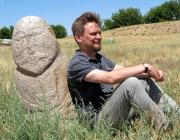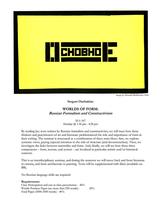
Oushakine, Serguei Alex. “Course Syllabus (Spring 2018): Worlds of Form: Russian Formalism and Constructivism (SLA 547).” 2018: n. pag. Print.
Abstract
By reading key texts written by Russian formalists and constructivists, we will trace how these thinkers and practitioners of art and literature problematized the role and importance of form in their writing. The seminar is structured as a combination of three main blocs: first, we explore systemic views, paying especial attention to the role of structure (and deconstruction). Then, we investigate the links between materiality and form. And, finally, we will see how these three components – form, texture, and system – are localized in particular artistic and/or historical contexts. This is an interdisciplinary seminar, and during the semester we will move back and from literature to cinema, and from architecture to painting. Texts will be supplemented with films (available on BB). No Russian language skills are required.
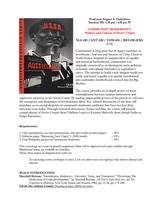
Oushakine, Serguei Alex. “Course Syllabus (Spring 2017) Communist Modernity: Politics and Culture of Soviet Utopia (SLA420 ANT420 COM424 RES420).” 2017: n. pag. Print.
Abstract
Communism is long gone but its legacy continues to reverberate. And not only because of Cuba, China or North Korea. Inspired by utopian ideas of equality and universal brotherhood, communism was originally conceived as an ideological, socio-political, economic and cultural alternative to capitalism’s crises. The attempt to build a new utopian world was costly and brutal: equality was quickly transformed into uniformity; brotherhood evolved into the Big Brother.
The course provides an in-depth review of these contradictions between utopian motivations and oppressive practices in the Soviet Union. By reading major political texts of the period we will trace the emergence and dissipation of revolutionary ideas. Key cultural documents of the time will introduce us to crucial elements of communist modernist aesthetics that have not lost their relevance even today. Through historical documents, fiction and film, the course will present central players of Soviet Utopia: from Vladimir Lenin to Kazimir Malevich; from Joseph Stalin to Sergei Eisenstein.
The course provides an in-depth review of these contradictions between utopian motivations and oppressive practices in the Soviet Union. By reading major political texts of the period we will trace the emergence and dissipation of revolutionary ideas. Key cultural documents of the time will introduce us to crucial elements of communist modernist aesthetics that have not lost their relevance even today. Through historical documents, fiction and film, the course will present central players of Soviet Utopia: from Vladimir Lenin to Kazimir Malevich; from Joseph Stalin to Sergei Eisenstein.
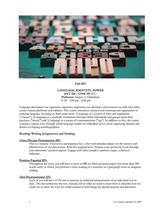
Oushakine, Serguei Alex. “Course Syllabus (Fall 2017) Language, Identity, Power (ANT326 COM319).” 2017: n. pag. Print.
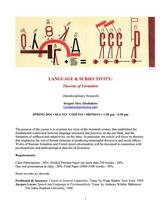
Oushakine, Serguei Alex. “Course Syllabus (Spring 2016): Language & Subjectivity: Theories of Formation (SLA 515 COM 514).” 2016: n. pag. Print.
Abstract
The purpose of the course is to examine key texts of the twentieth century that established the fundamental connection between language structures and practices on the one hand, and the formation of selfhood and subjectivity, on the other. In particular, the course will focus on theories that emphasize the role of formal elements in producing meaningful discursive and social effects. Works of Russian formalists and French (post)-structuralists will be discussed in connection with psychoanalytic and anthropological theories of formation.
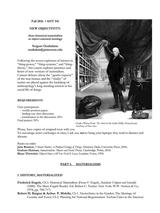
Oushakine, Serguei Alex. “Course Syllabus (Fall 2016) New Objectivity: From Historical Materialism to Object-Oriented Ontology (ANT 541).” 2016: n. pag. Print.
Abstract
Following the recent explosion of interest in “thing-power,” “thing-systems,” and “thing-theory,” this course explores promises and limits of new versions of materialism. Current debates about the “agentive capacity” of the non-human and the “vitality” of matter are placed against the backdrop of anthropology’s long-standing interest in the social life of things.

